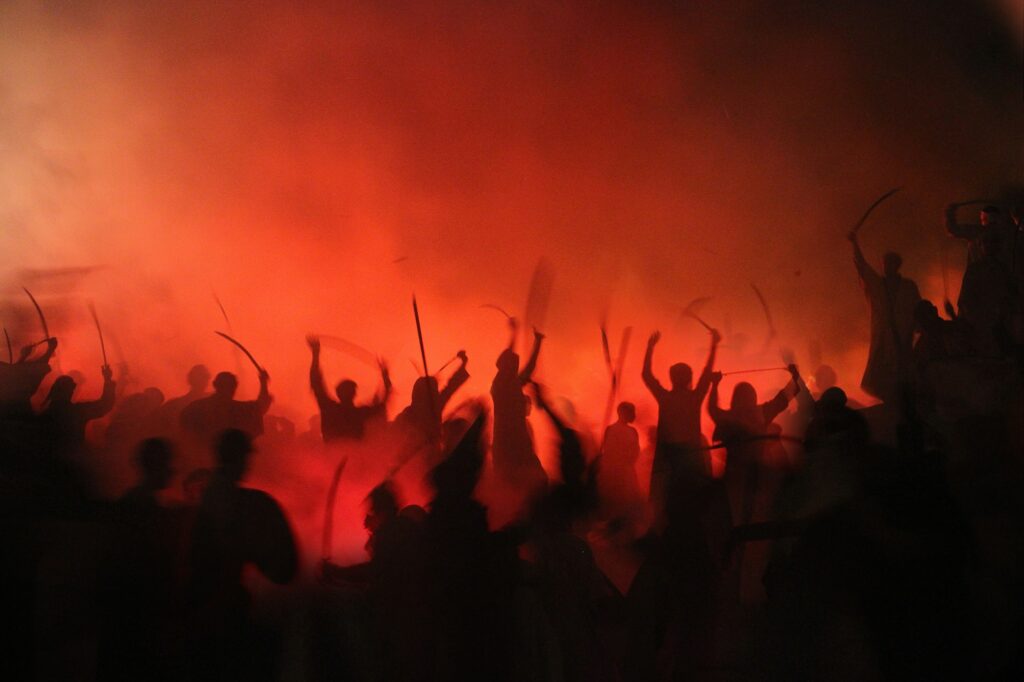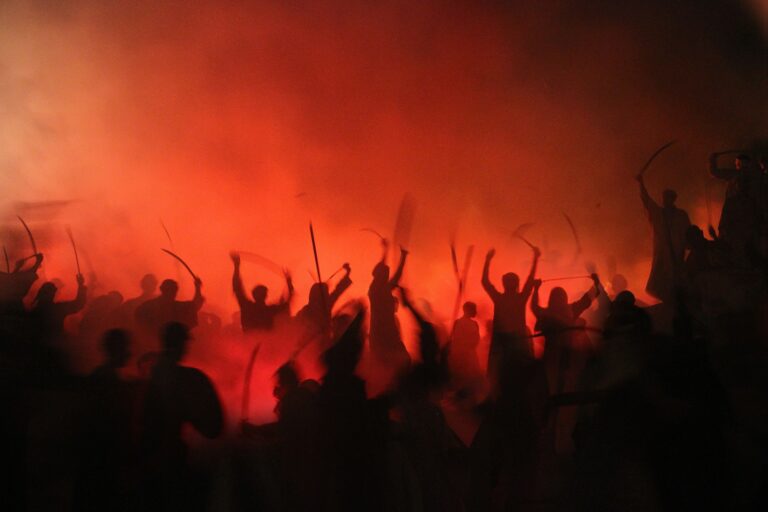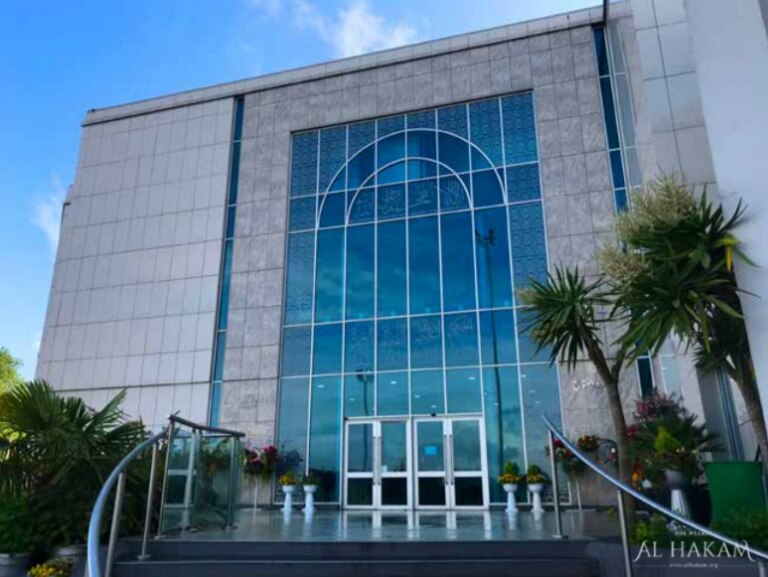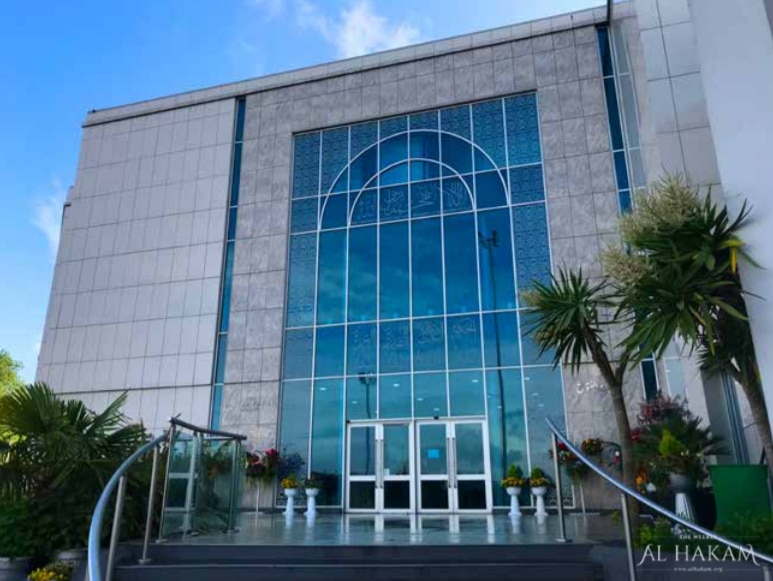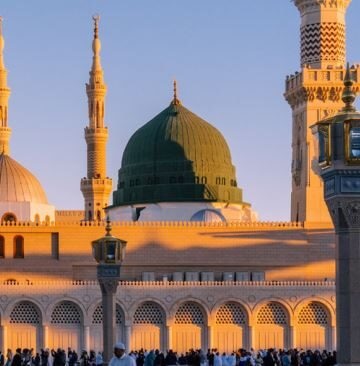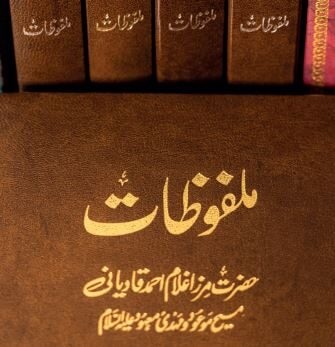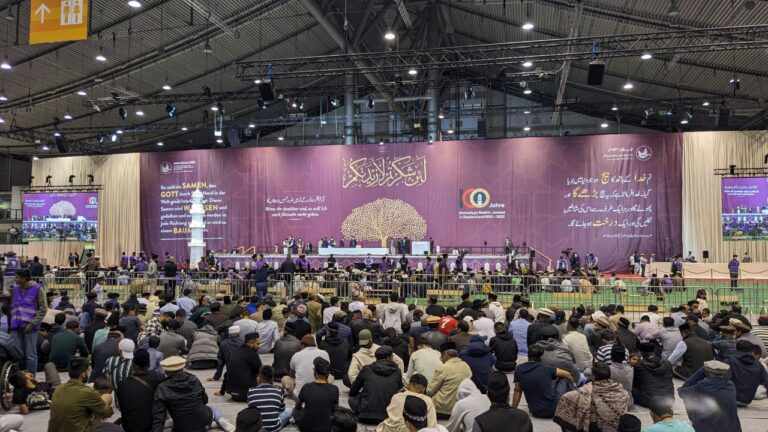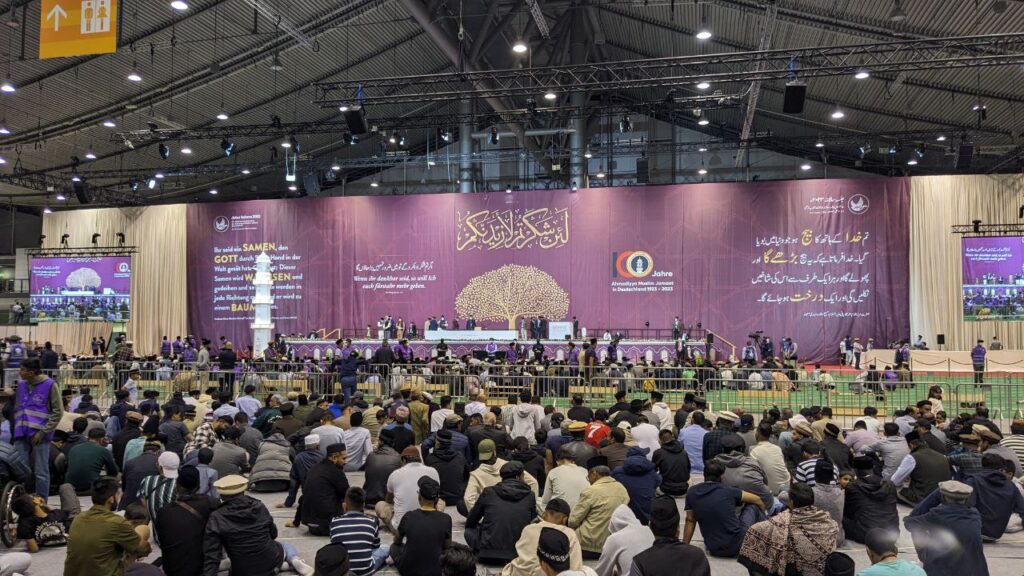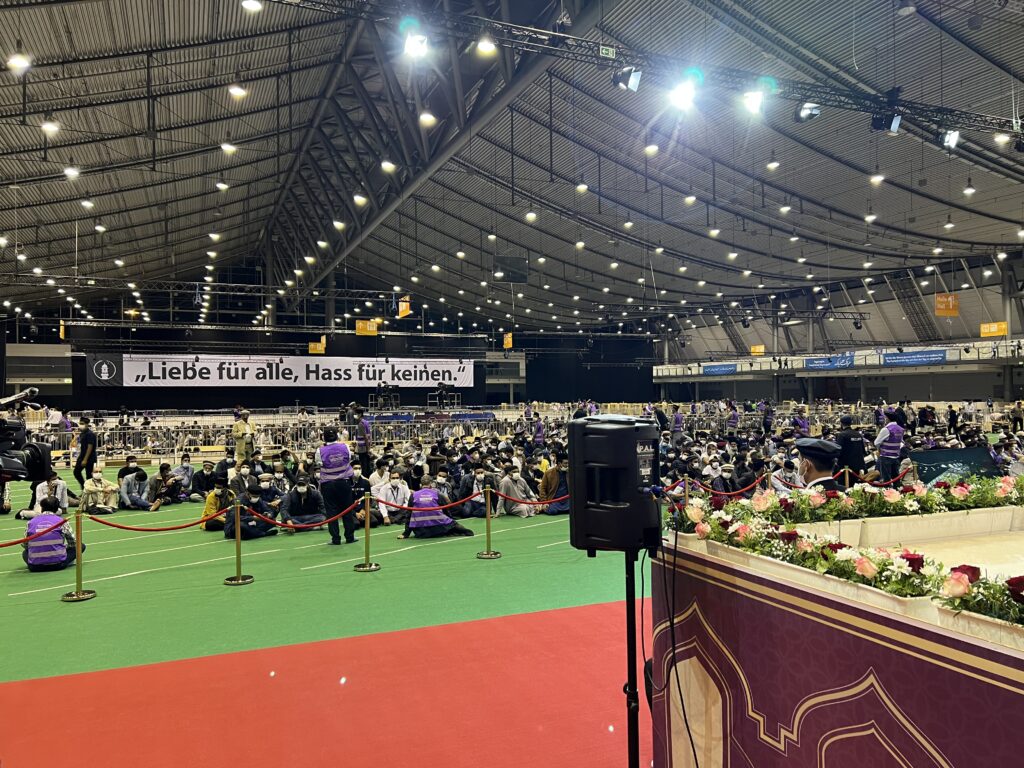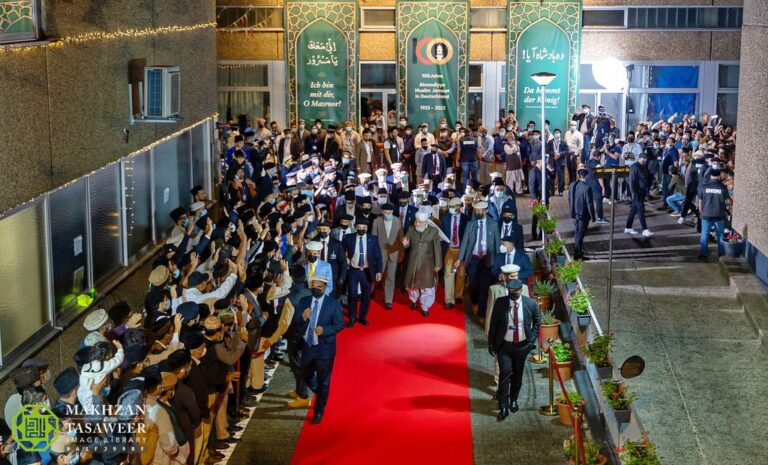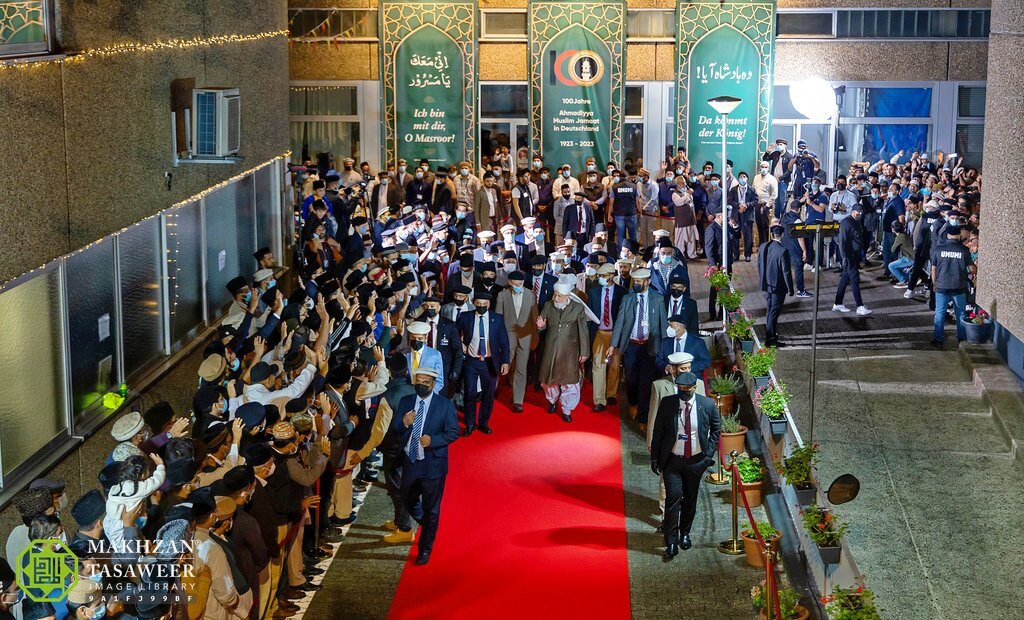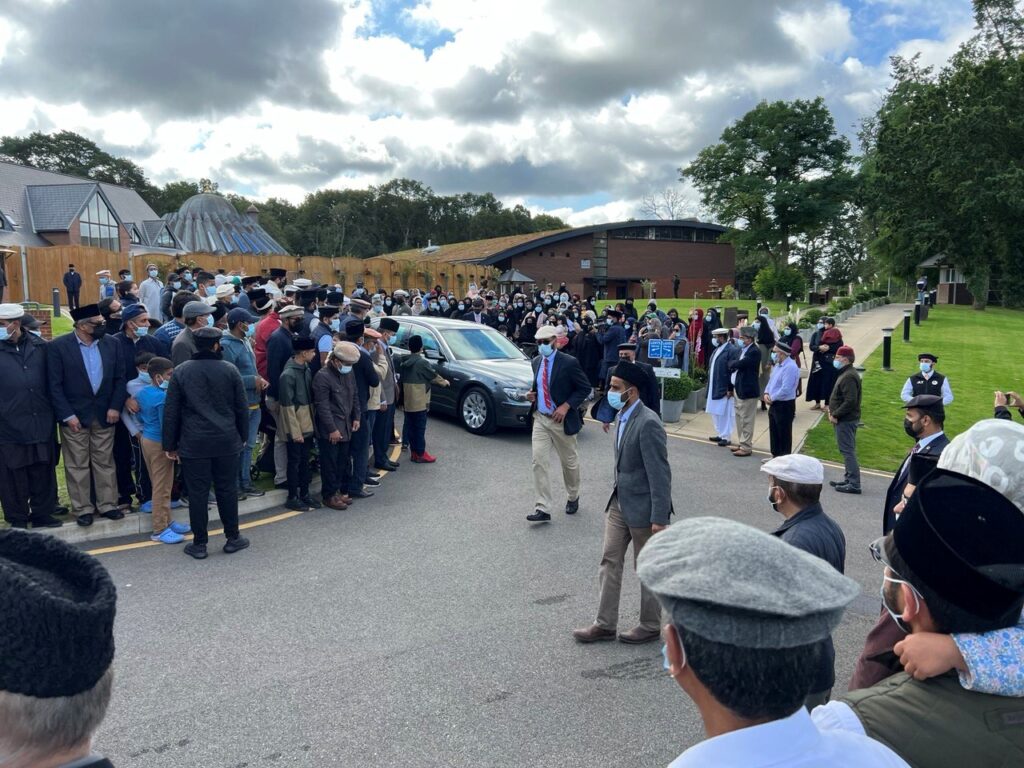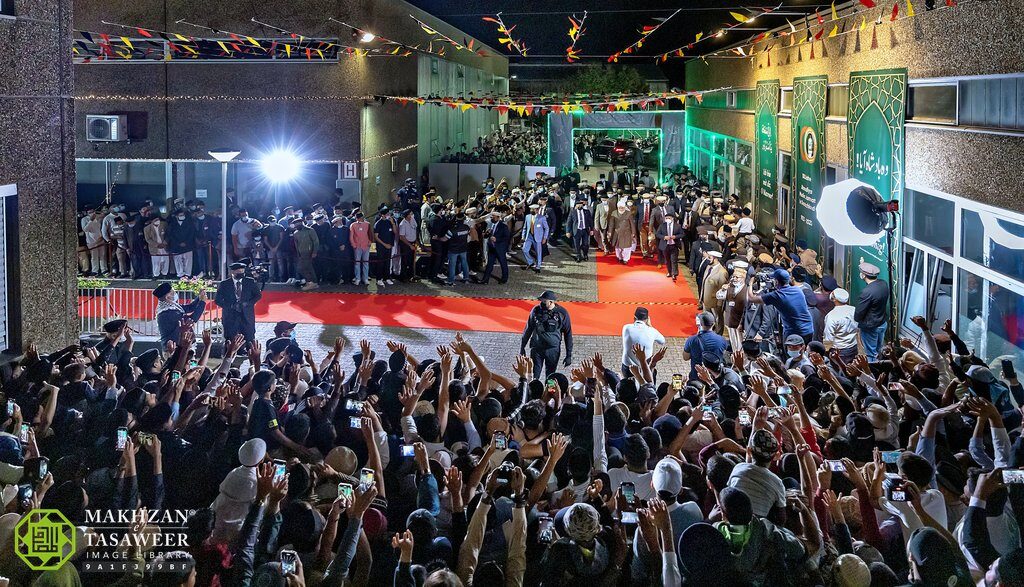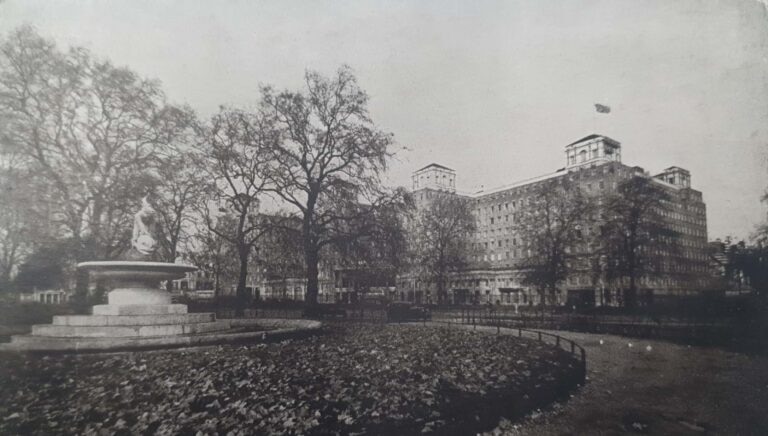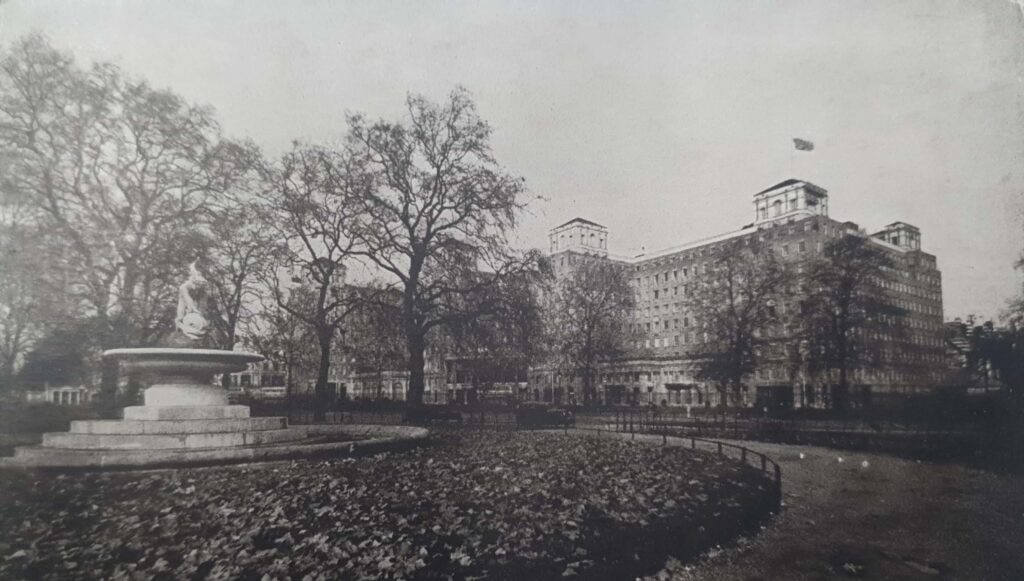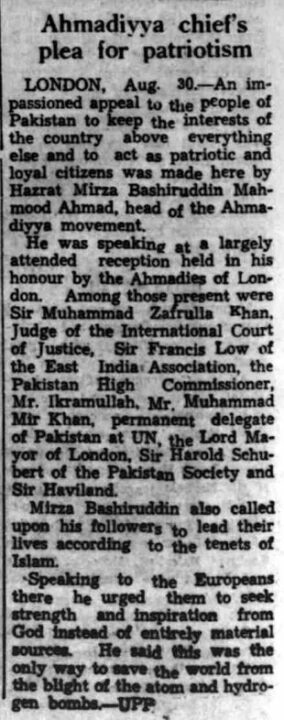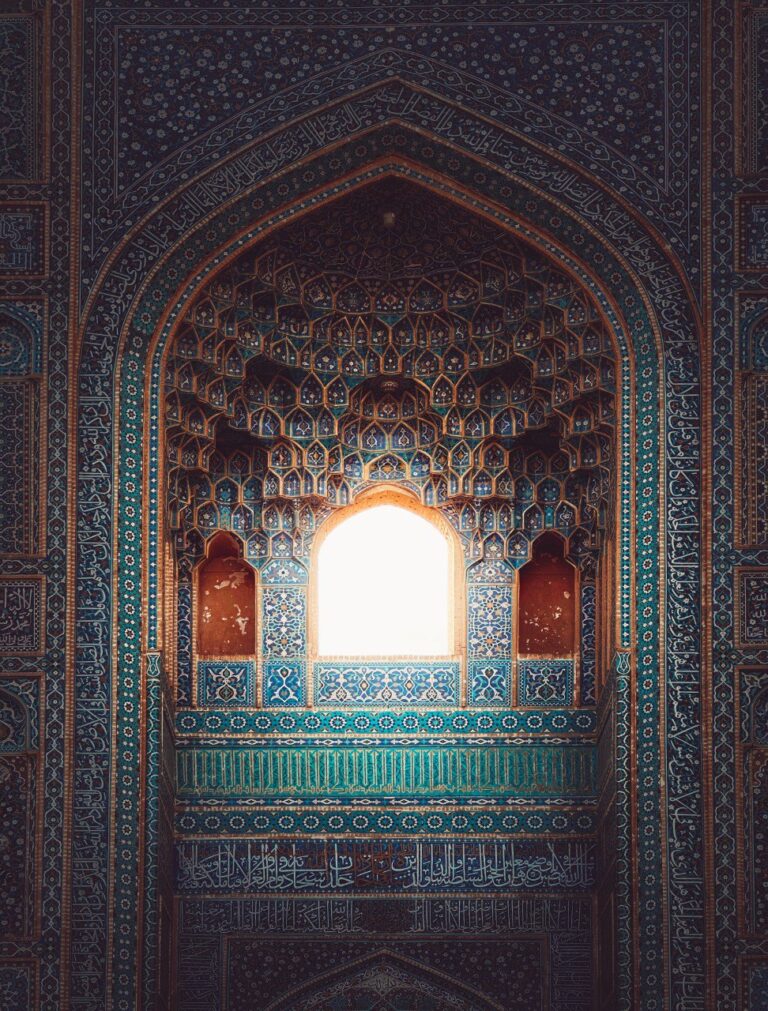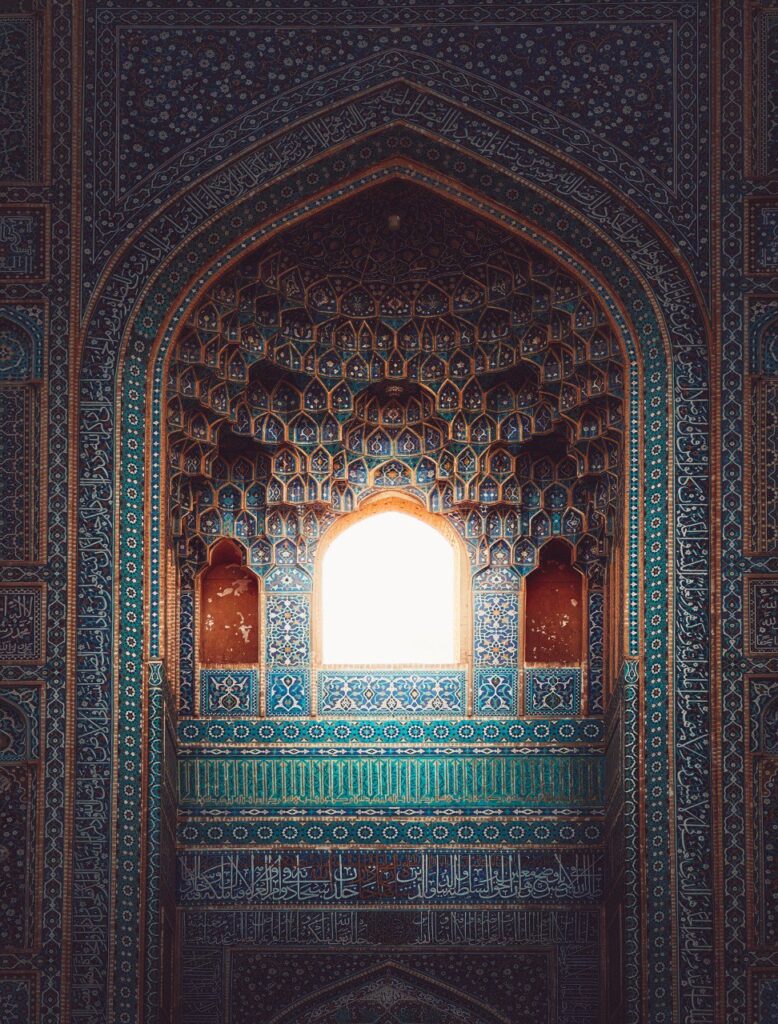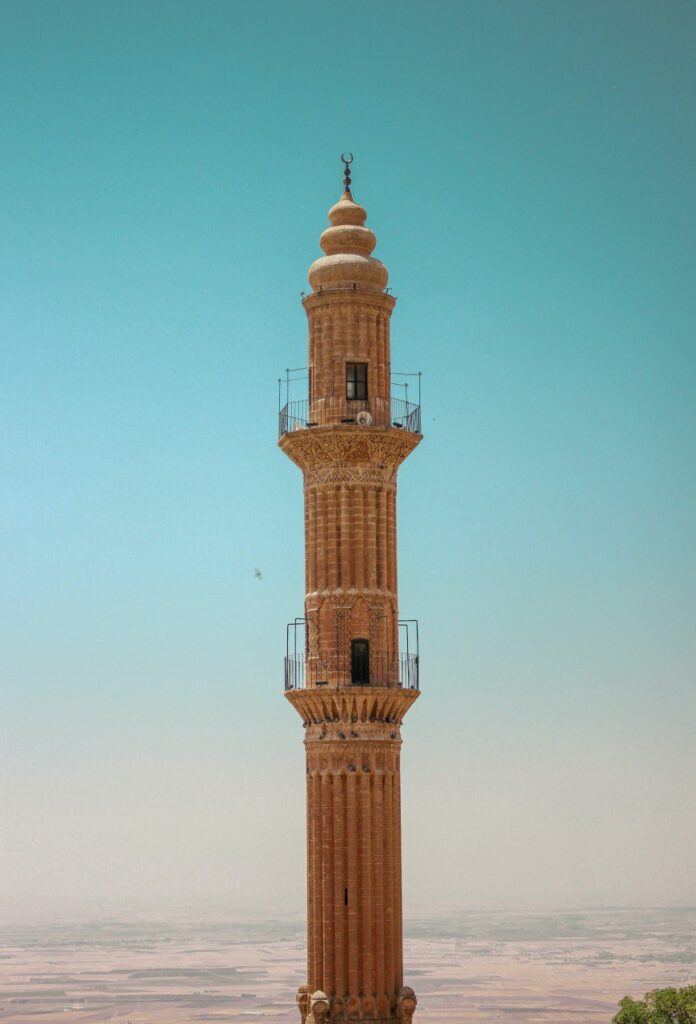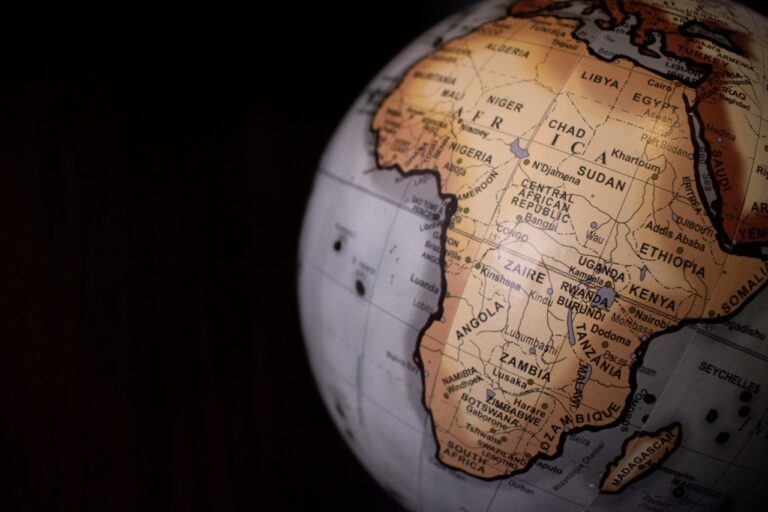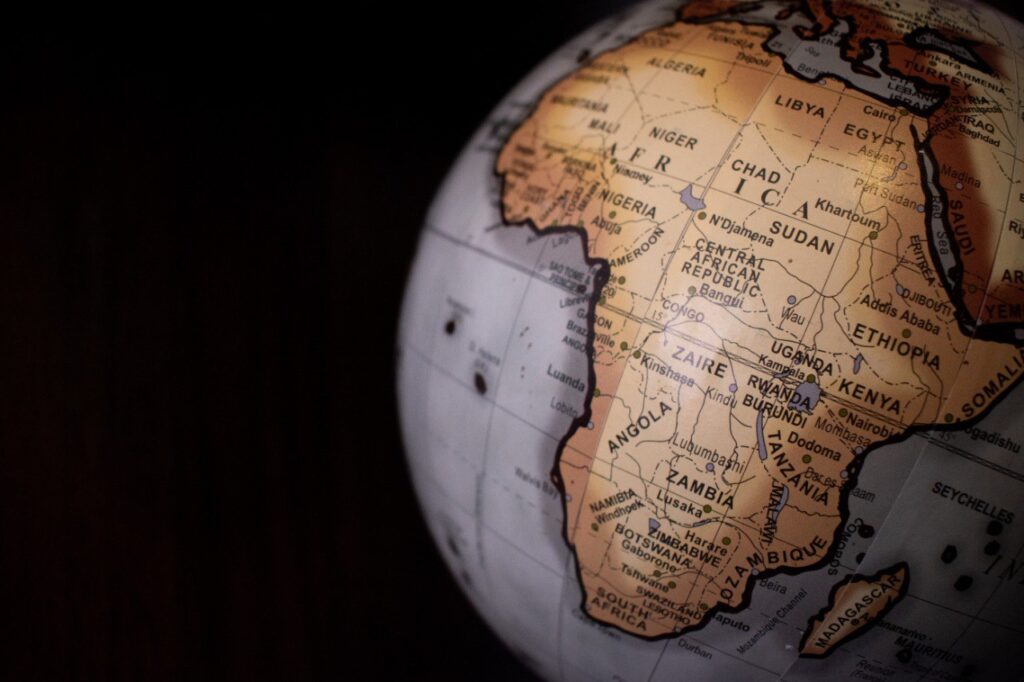Friday Sermon
4 August 2023
Jalsa Salana UK 2023: A most successful culmination
After reciting the tashahud, ta‘awuz and Surah al-Fatihah, Hazrat Khalifatul Masih Vaa stated:
Alhamdulillah [all praise belongs to Allah]! By the grace of Allah the Almighty, the Jalsa Salana [annual convention] of Jamaat-e-Ahmadiyya UK was held successfully on the previous Friday and came to a conclusion on Sunday. Despite the weather being unfavourable at times, by the grace of Allah the Almighty, overall everything was organised and managed without any major concerns. Additionally, the attendance this year was far greater than in the previous year. Hence, we will never be able to truly thank Allah the Almighty for this. He filled our Jalsa with countless blessings, and everyone experienced them, whether they were Ahmadi guests, or non-Ahmadi guests, who were in attendance from various countries.
We are weak. Whatever we accomplish is through the blessings of Allah the Almighty and these are showered upon us to such an extent that we are unable to count them. We witness the [fulfilment of the] following statement of Allah the Almighty at all times:
وَاِنۡ تَعُدُّوۡا نِعۡمَةَ اللّٰہِ لَا تُحۡصُوۡہَاؕ اِنَّ اللّٰہَ لَغَفُوۡرٌ رَّحِيۡمٌ
“And if you [try] to count the favours of Allah, you will not be able to number them. Surely, Allah is Most Forgiving, Merciful.” (Surah an-Nahl, Ch.16: V.19)
Thus, Allah the Almighty overlooks our shortcomings and blesses us in ways and through means for which we can never do justice in expressing gratitude to Him. Nevertheless, we are commanded by Allah the Almighty to continue to be thankful to Him, and if you do so, He will bless you even more. Thus, it is our responsibility to be grateful for the favours of Allah the Almighty and to submit before Him. As long as we fulfil this responsibility of ours and continue to consider the success of our undertakings to be the mercy and blessings of Allah the Almighty, we will continue to stride forward, insha-Allah. Hence, for the success of this Jalsa, we should first and foremost be grateful to Allah the Almighty, and we should also seek forgiveness from Him for our shortcomings in its organisation.
Similarly, all the participants should also be grateful to Allah the Almighty for granting them the opportunity to participate in the Jalsa and quench their spiritual and intellectual thirst. Generally, everything was conducted with ease, despite the fear that Covid had not yet completely disappeared. Despite such a large gathering, on the whole, Allah the Almighty kept us under His protection. May Allah the Almighty keep everyone under His protection afterwards as well. Some people fell ill after Jalsa, in fact, they became unwell two or three days after Jalsa, not immediately. May Allah the Almighty grant them health and protect them. As far as I am aware, there are very few individuals who have contracted this virus. In my opinion, this is not due to the Jalsa, rather, the government has made a general announcement that cases are increasing in some places. Now this virus is similar to other illnesses that increase and decrease. In any case, may Allah the Almighty cure everyone who is ill.
I now wish to thank all the workers. This time, overall, everyone fulfilled their duties in an excellent manner, and on top of that, with a smile on their faces, in line with the instructions I gave them in the beginning. May Allah the Almighty reward them all. This time, the workers in all departments displayed a special expertise while carrying out their duties, both on the men’s and women’s sides. Every year there are complaints on the women’s side regarding the dining and food supply arrangements, however, on this occasion, these complaints were virtually non-existent. Furthermore, this time the Lajna side was moved in order to have all the facilities in one area, such as the dining marquee and other necessary arrangements, and this was liked by the women in general. If there were any shortcomings, then, insha-Allah, they will be dispelled in the future.
Similarly, there were the departments of traffic, dining, roti plant, security, and hygiene. Then, most of all, MTA, which connected the world in a new way this time. In any case, the workers in all departments, whether I named them or not, on both the men’s and women’s sides, made great efforts to fulfil their duties. I, therefore, express my gratitude to all of them. The non-Ahmadi guests in attendance expressed their amazement after witnessing the hard work and excellent attitude of all the workers, and this example displayed by all our workers serves as a form of silent and practical tabligh [preaching]. May Allah Almighty grant them all the best rewards. [Amin.]
I only wish to draw the attention of the Jalsa Salana department to one point, and that is that the water was turned off right as Jalsa came to a conclusion; hence, no water was available in the lavatories. At the very least, the water should remain running for another 12 hours. Aside from this, the arrangements were generally much better. What were the remarks of the non-Ahmadis and non-Muslims who attended from other countries? What were their impressions after witnessing the Jalsa arrangements and the Jalsa as a whole? I shall present a few remarks, but it is not possible to present them all.
Professor Dr Diallo Jean of Burkina Faso is a renowned eye specialist and professor at a medical university. He is also serving as a colonel in the army. He also comes regularly to our eye institute, and this is the first time he had the opportunity to attend [the Jalsa]. [He said,] “This is the first time I attended the Jalsa. The first thing I was impressed with was that thousands of people are all gathered in one place, for a single purpose, around one religious leader. Everyone is united, and everyone has the same goal. It was amazing to witness such extraordinary arrangements and people from all backgrounds gathered in one place. I integrated with the guests to work out if it was all true or merely for show; however, I did not see displeasure on anyone’s face. It is incredible to have people from different regions, countries, and nations, from all walks of life, gather for one purpose, in one place, at one person’s hand.”
Hence, this is the way in which the Ahmadi participants in the Jalsa are carrying out tabligh in a practical way to the non-Ahmadis. He then says, “The standard of the speeches was very high. These speeches were very beneficial in educating us, and in preparing us for one purpose and direction. I also listened to the addresses of the Khalifa of the time. He presented the teachings in light of the verses of the Holy Quran.” He continues, “I now recognise just how much the world is in need of understanding the message of God Almighty, and how the world is in need of such a person who will help them understand this message. That is why the institution of Khilafat in the Ahmadiyya Community is an institution that the entire world can learn from.” He says, “Another thing that I observed is that Ahmadis have an extraordinary bond of loyalty with God Almighty and their Imam. Everyone is united and connected as one. They trust that their leader will guide them on the right path.” He says, “After seeing this Jalsa, it is my intention that if Allah the Almighty enables me, I will attend this Jalsa every year, because for three days here, people talk about establishing a connection with God Almighty and about humanity, and it is necessary for me to learn about these things as well.”
Then, there is a renowned senior law professor from the USA, Dr Brett Scharffs, who also attended the Jalsa. He says, “I was very happy to be here and see such a large gathering.” Whilst mentioning everyone’s cooperation, he says, “I have also organised various events across the world where registration is required, however, it was amazing to see the very organised manner in which registration was being done at the Jalsa in a matter of minutes. I had only just arrived and sat in the office and within a few minutes everything was prepared and given to me. I was then told that the guest registration and other important matters are taken care of beforehand, so that guests wait as little as possible.” Masha-Allah the workers at registration carried out their duties excellently. He says, “The hospitality was amazing. Despite there being so much traffic, seeing all the volunteers work in such a systematic and cooperative manner was an unforgettable experience.” In short, he complimented all the volunteers that he came across.
The mayor of a city in Belize was also in attendance. He says, “Never in my life have I seen such peaceful people, who are so loving and peaceful. I cannot fathom that certain people associate terrorism with Islam. The spiritual atmosphere that I saw here and the mutual love, affection and kind treatment among the people are certainly commendable.” He says, “I wish to come to the Jalsa again next year, but not as a mayor, but rather as a volunteer.” He says, “The volunteers and workers have inspired me so much that I also wish to be a part of organising such an amazing Jalsa. I have never seen such a great gathering before.” Then he says, “The future of this world is certainly Ahmadiyyat.” This is the true Islam that the Jamaat presents, and even non-Ahmadis are impacted by it.
Michael Wilson, from Ghana, is the chief technologist of an organisation called the Council for Scientific and Industrial Research under the Ministry of Environmental Science and Technology. He gets the opportunity to take part in various conferences around the world. He also attended the Jalsa. In a conversation before the Jalsa, he said upon seeing the arrangements, “Whatever I have seen up until now could never be possible without the blessings of Allah the Almighty.” He arrived at the Jalsa site on Friday and he kept on saying, “The commitment of the volunteers here has left me astounded. This is certainly a divine Community, and all of this work is impossible without the blessings of Allah the Almighty. There is a very disciplined and beautiful atmosphere here. All the volunteers are educated; some of them are consultants, yet during the Jalsa they are doing carpentry or cleanliness work. If these volunteers did not have the fear of Allah the Almighty in their hearts, then they could not have achieved this standard of work.” Those volunteers who do silent tabligh in this manner are very fortunate. He was also moved by the International Bai‘at ceremony. He says, “Before the Jalsa, I did not know about Ahmadiyyat, but now I know, and I think I will attend every year.” He also said that more people in Ghana should be introduced to the Jamaat, as there is still work to be done in this regard.
Mr Joel Turenne from Haiti, a representative of the Ministry of Religious Affairs in Haiti also attended the Jalsa Salana UK. He says, “This was my first time attending the Jalsa. This was a very impactful and joyful experience for me. The organisation was excellent. Despite this being a gathering of more than 40,000 people, I did not see any disorder. Everyone met each other with a smile on their face. I could see everyone was trying to ensure that they did not cause any sort of difficulty for others, and instead, everyone was being mindful of each other’s comfort. I have not seen this in any other religion or even worldly gathering.” This is one of the very purposes of Jalsa as explained by the Promised Messiahas. (Shahadatul Quran, Ruhani Khazain Vol. 6, p. 395)
He says, “Despite there being different cultures, colours and backgrounds, everyone was meeting each other as if they all belonged to the same family. Every day, people from different countries were eating the same type of food as if it were their favourite.” He says that he was curious and so, “I asked an African guest. how is it that people do not have any sort of opposition or reservations in any matter. He told me that here at the Jalsa, we only gather for the sake of Allah’s pleasure and to see, hear, and meet the Khalifa, and that is why all other worldly things hold no importance for us.” He says, “This deeply impacted me.” Then, he commended the Jamaat, saying, “Despite facing opposition, the Community is striving to spread peace in the world.” Then he says, “There is no discriminatory treatment amongst Ahmadis. Everyone was equal. This is the first time I have seen something like this. People of all age groups were volunteering their services. There was traffic control, parking, catering, water supply, discipline, and everyone was serving with dedication.” He says, “I have seen many great qualities in Ahmadis that, to this day, I have not seen anywhere else.” He says, “I have listened to and seen the speeches of many religious scholars, and everyone says that what they are saying should be adhered to. However, Khalifatul Masih conveyed the message of Allah, [Prophet] Muhammadsa and the Promised Messiahas and guided everyone as to what should be adhered to and followed.” He says, “This was astonishing for me.” He sat inside the Jalsa marquee all three days and listened to the speeches. In fact, he listened more attentively than many Ahmadis, as he was taking notes of the various speeches. He had made a diary in which he took notes, and if he could not understand something, he would ask the person sitting next to him to explain. He says, “After attending this Jalsa, although I am not an Ahmadi, I am an advocate for the Ahmadiyya Community and wherever Muslims are mentioned, I will inform them that the true and practising Muslims are Ahmadis and I will defend you.”
Then there is Luqman Hakim Saifuddin, former Minister of Religion in Indonesia; he says, “I felt a great sense of pride upon participating in the Jalsa. I started seeing your slogan of ‘Love for All, Hatred for None’ from the London airport all the way to the Jalsa site, and this is exactly what I witnessed during the days of Jalsa. I saw excellent hospitality everywhere. I saw a firm bond of brotherhood. I saw an atmosphere of meeting each other with a smile, congratulating one another, and praying for one another.”
Lamin Jammeh, the Minister of Information from The Gambia also attended the Jalsa. He says, “I was very impressed with the organisation of Jalsa Salana 2023. Even more impressive were the volunteers, who selflessly carried out their duties and maintained discipline. It was such a large gathering, yet there was not a single incident of pushing, shoving or any sort of quarrel. Everything was organised very well and no lapse could be seen.” He says, “Another thing that I observed was the love that the members of the Community have for their Imam, the like of which cannot be seen anywhere else.” He says, “I cannot go without attesting to the fact that today on the face of the earth, the true image of brotherhood lives in the example of the Ahmadiyya Community, where everyone meets each other with a smiling face, irrespective of colour or background, as if they have known each other for ages.” Then he also writes about the services of the Jamaat in The Gambia, which he says they greatly appreciate.
Then, there is Ebrima G Sankarreh from The Gambia, who is an interpreter for the government. He is also an advisor to the Chief of State for Diaspora. He says, “The overall organisation of the Jalsa was a clear reflection of its success. From the administration and management to the brotherhood and mutual love of all the attendees, all was commendable. All addresses and speeches were brimming with insight, and all the speakers spoke about inculcating mutual love and establishing peace in society.” He further says, “I was greatly impacted by the opening and closing addresses of the Khalifa on the kind treatment of marginalised and poor groups in society. After personally meeting people of different demographics of society, including the youth and elderly, (he had the opportunity to personally meet people), my hope has been rekindled that despite the difficulties prevalent today, the world has a bright future. I have met such people who are striving to make the world a peaceful place for all of humanity.” He further says, “I was also astonished to observe the organisation with which the Community is able to host over 40,000 Muslims from various countries. In the end, the most impactful factor was the passion and zeal of the youth to voluntarily come forward to serve. Their organisation, management, respect for authority and selfless service have left everlasting imprints on my mind. The world has a bright future because there are such youth who are striving to make the world a better place.” Thus, the impact of our youth on guests is also a form of silent propagation.
Luiz Carlos Da Silva was a newspaper representative who came from a metropolis in Brazil. He says, “I enjoyed everything. To gather people from 118 countries and create an atmosphere of brotherhood cannot be achieved by anyone else. I really appreciate how people greeted one another with respect, morals, joy and sympathy.” He also praised the Jalsa programme, as well as the management of transportation for guests. He expressed that this was extraordinary. He further says, “I would like to say one thing; of the thousands of people I saw working in this grand Jalsa, none of them were insincere. The volunteers were selflessly rendering services. In fact, I saw everyone serving with passion and enthusiasm.”
Then, there was a guest from among the delegation from Spain. By profession, he is a historian and an archivist. He works at the Al-Andalus Library in Cordoba. He says, “I have come to Jalsa Salana upon being invited, and I am very grateful for it. I have learned a lot about Islam and Islamic culture from you. You all have hosted me very well and given me great respect. I will never forget this. Never have I seen this many people from different faiths and cultures come together in one gathering. Certainly, these people have gathered here out of their love for Allah the Almighty.” He further says, “Today, the Ahmadiyya Community is truly a lofty example of what determination, resolve and striving really mean. I will always keep this example in view in my daily life. This was a lesson for me.”
A journalist from Italy by the name of Marco Respinti, who is the chief editor of a newspaper, also attended. He says, “I had heard and read about Jalsa before, however, to attend it is an entirely unique experience. I have been deeply impacted by the work of the volunteers. Alongside this, another thing I observed was the excellent organisation and management for such a large number of people – which is a truly difficult task.” He says, “To organise and manage an event at this scale effectively is no ordinary feat. However, the most significant thing I observed during Jalsa was the prayers; prayer was of special significance to all people.” He further says, “Although I am not a Muslim, I feel that the manner in which Ahmadis offer prayer is a primary obligation for every human to fulfil. I was delighted to see the affection and sincerity of thousands of people there.” He says, “Being a journalist, I had the opportunity to meet many people – some new and others familiar. I also learned a great deal about the history of the Ahmadiyya Community.”
The Governor of the Kolda region in Senegal also attended [the Jalsa]. He says, “This is the first time I attended the Jalsa. I am saying this with complete honesty, that until today, I have not seen organisation and management the likes of which I have seen during this Jalsa. Ahmadis love the Khalifatul Masih in a manner that cannot be expressed in words. As a Governor, I have had the opportunity to travel frequently, however, I have not witnessed a love like this anywhere else.” He says, “The excerpts of the Promised Messiahas that were presented have taken a place in my heart and have greatly impacted it.” He says, “Something unique that I have observed during this Jalsa is the spirit of sacrifice.” Among the objectives of the Jalsa, the Promised Messiahas also stated that we should also make sacrifices for one another, which he witnessed. (Shahadatul Quran, Ruhani Khazain, Vol. 6, p. 395)
He further says, “Every person was giving preference to others over themselves.” He says, “In my days as a student, I had heard about Caliphates, however, it is only in the Ahmadiyya Community that I have witnessed a true example of a Caliphate. If the entire Muslim Ummah follows the Ahmadiyya Community, Muslims will surely find success.”
There was a guest from Colombia by the name of Rozo Valencia. He says, “I have been deeply impacted here by the peaceful atmosphere, brotherhood, love, the insightful addresses of the Caliph and by observing the members of the Community. What I have observed during the Jalsa gives me hope and confidence to believe that despite the difficult times, conditions can improve.” He further says, “God is with us. The message of the Caliph has reached my soul, because peace is the highest and best means of spending your life.” He strongly praised the volunteers by saying, “Their organisation was astonishing. The manner in which the guests were hosted was astounding. I saw smiles everywhere.” He further says, “The voluntary service of the Jalsa Salana is a model for the world and a lesson of love for seekers of God.”
The Ambassador of Argentina to the UK, Javier Figueroa, attended the first day of Jalsa. He was so impacted by the management and atmosphere of the Jalsa that afterwards, he invited all the delegations from Argentina and neighbouring Latin American countries who attended the Jalsa to a formal event in his embassy in order to further introduce the Jalsa to ambassadors from other countries as well as diplomats appointed in the embassy. He says that he was deeply impacted by the teachings and practical examples of the Community. He expressed his personal desire and readiness to cooperate and said that he would try to introduce the Community, especially to the political sector and other diplomats.
There were three guests from Chile who belong to a Christian organisation. Among them is Dr Nestor Soto, a Christian priest and theologian. He is also the founder of a Christian organisation in Chile. He says, “What impacted me the most was the unity and mutual love of the Community.” He continues, “For the past 40 years, I have attended various Christian events all across the world, however, I have never seen an event as vast as the Jalsa of the Ahmadiyya Community, an event run solely by volunteers.” He is a man of great influence, who is in touch with the American President and government. He also holds his religious meetings in America, where he gathers religious people from around the world. He further says that, in his view, the secret to the success of the Jalsa of our Community is our unity which is established by the Khalifa of the time. It is by the grace of Allah the Almighty that the Caliphate is established. In his opinion, it is a miracle that it has been more than 130 years since the Community was established and no major conflict or discord has arisen. He says, “The greatest weakness of our evangelical Christian organisations and other Muslim organisations is the disagreements and conflicts that arise in pursuit of leadership.” He further says, “On the contrary, upon observing the Jalsa management and programme, I realised that your Community is like a single body. The Khalifa of the time is the head and brain of the body, while the Community members represent other body parts that act in accordance with the signals of the brain.” Thus, even guests can ascertain the significance of the Khilafat.
Eloy Perez from Spain, who is currently learning about Islam Ahmadiyyat, says, “I was treated even better than a king at this Jalsa. I was taken great care of and felt like I was at home. For the Ahmadiyya Community’s volunteers to serve more than 40,000 people was indeed a miracle. During the tour of the photo exhibition, I had the opportunity to learn a great deal about the Ahmadiyya Community. This [Community] is a dynamic and ever-living part of history. During the proceedings, I felt a spirit of brotherhood. I would like to assure you that I am firmly attached to God, even though I am not a Muslim, however, the concept of God is the same in various religions. Undoubtedly, it was obvious to see during the Jalsa that Allah was with you and with all the Ahmadis. I was extremely impressed when I witnessed the Ahmadiyya Community renew their faith on Sunday. Many of them were crying owing to their emotions and happiness. I really liked the speeches that were delivered and I particularly took away the message that a true faith is one that teaches compassion; a Muslim who does not show mercy to mankind is not a Muslim or a follower of Allah and there is no distinction between a rich and a poor person in the mosque.” He then wrote in his letter to me, “I must admit that what I liked the most was the opportunity to have a personal audience with you.” He then also expressed his desire for me to sign a T-shirt and he took the signed shirt with him.
Kyle Seeback is a Member of Parliament in Canada. He says, “It was an extraordinary moment for me to attend the Jalsa which teaches the lesson of loyalty to one’s faith and a spirit of volunteerism.” Then, with regards to the persecution against the Jamaat, he said, “The whole world should stand up against this and help the Ahmadiyya Community and support the Ahmadi lawyers. The mosques of the Ahmadiyya Community are being destroyed and they should speak out against this.” He had brought a diary with him in order to take down notes of all the various things being said, but he said that he got so immersed in his conversations that he forgot to take down any notes.
The Vice Chief of the Indigenous Nation of Canada, Aly Bear, says, “I am very fortunate that I attended the Jalsa this year along with other leaders of the indigenous people. The International Bai‘at ceremony was a very emotional moment for me. I have never witnessed such scenes before in my life that enabled everyone to join in unity with one another. Everyone was emotional, and I was also crying. The manner in which the International Bai‘at is conducted is very similar to the way we worship. But although the manner in which it’s done is similar to the way we worship, I have never felt such spirituality in our worship as I did during the International Bai‘at. I am taking back with me a message of love and peace.” She also said, “I will convey your message of ‘Love for All, Hatred for None’ to my people as well, and it was a great honour and privilege for me to come here.”
A woman from Honduras who works as a TV anchor said, “I listened to the addresses of the Caliph very attentively. I attended the Jalsa and listened to the speakers delivering their speeches. I felt extremely fortunate to have been given such a great opportunity. I had the opportunity to meet so many people. I witnessed a passion for serving others selflessly and with humility. I have never observed such a level of organisation before.”
After listening to my address delivered on the ladies’ side, she said, “There is a great need to highlight the importance of women’s rights in Honduras.” She also mentioned that she would prepare a video about this so that people could easily understand the message.
Some of the owners of a printing press in Turkey were also in attendance. They have printed various books of our Community, including the Holy Quran as well, which is very beautiful and you must have seen it at the bookstall as well. The directors of this printing press had come to the Jalsa and one of them said, “I was astounded to see how you were able to organise an event on such a large scale in such an excellent fashion and without any problems despite the adverse weather.”
He then mentioned another aspect which has an impact on the people and becomes a means of tabligh as well. He said, “It was strange to find that in such a large event, I did not see anyone smoking. It was also amazing to see how people were complying with the instructions of those on duty and doing so in an orderly fashion. People were listening to even the children and young people who were on duty.”
A director of another company said, “I was not aware of how extensive the Community was. Whilst visiting the exhibition and looking at the photo gallery of the martyrs, I was shocked to learn that even in this day and age, such acts of cruelty were being perpetrated in the name of Islam and in a Muslim country.” Both father and his son were in attendance and said, “We did not have plans to attend the Jalsa due to a very important business meeting which was going to take place during the Jalsa dates, however, the meeting got cancelled for some reason and so we made the plan to visit Jalsa. It was great that this happened because coming here was an unforgettable experience for us.”
A lady who works as a social worker in Latvia attended the Jalsa and writes, “I did not know much about the Community before. However, during the Jalsa I had the opportunity to learn a great deal about Islam Ahmadiyyat. Upon returning, I will study the Holy Quran and increase my knowledge about Islam. The atmosphere of the Jalsa was very peaceful and pure. Everyone was smiling and all the workers took great care of us. I am filled with immense sentiments for the hospitality and kind treatment afforded to me at the Jalsa Salana, however, I do not have the words to express this.”
Those who were watching the proceedings on TV in different parts of the world have also sent in their comments. One of our missionaries from Congo Brazzaville has written that Mr Chris, who is a Christian, was invited to watch the Jalsa. After listening to the concluding address, he said, “If every government of the world was to act upon this teaching then even if the world was not completely alleviated of poverty, at least no one would go to sleep at night hungry. If our leaders today were to take care of their people like the Khulafa of Islam did in their time, then our world would become like a paradise. I have felt at peace after listening to the address. The manner in which our Khalifa has presented the teachings of Islam has brought peace to my heart. And the reason why I have said ‘our Khalifa’ is because from today onwards I am also with you and he is also my Khalifa.”
A social worker from Latvia, Egija Uzane was also in attendance, she said, “Since we have arrived, we have been living in a very beautiful and peaceful atmosphere. Everyone can be seen smiling. It is a surreal atmosphere and I am worried that when I go back, I will return to the same atmosphere filled with tension and people glaring at one another.”
The missionary for the Family Federation for World Peace, in Iceland, Paul Herman says: “My experience at the Ahmadiyya Community’s annual international gathering this weekend from beginning to end was a pleasure. All the members of your community that I met were warm-hearted, polite, considerate, ready to serve and caring. The arrangements for accommodation were excellent. All these things were key components for three memorable days. Considering the great number of people in attendance, the organisation was excellent.” He further writes: “All the volunteers helping out were, in my estimation, so well prepared they did not seem stressed no matter how much pressure they were under.”
He further says: “Of course, the fact that the crowd was so cooperative helped a lot. And I am sure that this, besides good preparation, is a reflection of the good character that the members of your movement have developed through putting the principles you preach into practice.” Hence, this impression of the guests and hosts has a positive impact on others. With regards to the translation, he says that at times he found the translation difficult, but whatever he understood he enjoyed it thoroughly.
There was a lawyer from Holland who had similar sentiments. Then there was Pierre Emmanuel, who was a representative of the Judicial Police, Haiti. He writes: “I was honoured to be a guest in the Ahmadiyya Muslim Jamaat’s International Jalsa Salana. As a Christian, I not only learnt about Islam, but I learnt a lot about religions as well. Seeing people belonging to different beliefs, cultures and languages – whose customs were very distinct – all unified as one was an extraordinary phenomenon. Undoubtedly this is worthy of praise and a model to be followed.”
He further says: “After participating in the Jalsa, I thought about the loyalty and respect Ahmadis have in their heart for their faith and thought whether they were really harbouring hypocrisy in their hearts (This thought crossed his mind). But then I realised that the mutual brotherhood between Ahmadis removes all doubt about any form of hypocrisy.” Thus, these sentiments ought to serve as a means for every Ahmadi to safeguard their faith. He further said: “I am returning to my homeland and taking back with me the message of peace, love, caring for one another, obedience and kindness to one’s relations, all of which I found in these three unforgettable days.
Bilal Qudan, who is a new convert from Australia, says: “I will never be able to forget these extraordinary days, the incredible discipline, love and brotherhood. Taking part in the International Bai‘at was a new experience for me. It increased my spirituality and also bestowed contentment upon me.”
Yunus Sahib from Mayotte Island also participated in the Jalsa. He says: “When I entered the Jalsa [site] for the first time, it seemed as if a special power had captivated my heart and upon witnessing the Jalsa set-up I was stunned. Previously I had heard about the Jalsa, but being a part of it in person was a different experience altogether.”
People pledged allegiance upon hearing about the Jalsa set-up. A person in Guinea Bissau pledged allegiance upon witnessing the Jalsa organisation. The Amir of Tanzania wrote that a person from Tanzania watched the Jalsa on MTA and pledged allegiance. Musa Sahib married a non-Ahmadi lady in 1970. He tried his best and prayed for her to accept Islam Ahmadiyyat, but she did not agree. This year, that family was watching the Jalsa Salana on MTA. His wife was also present and participated in the International Bai‘at ceremony. After the Bai‘at, the lady said: “This Jalsa has had a profound effect upon me and the sermons of Khalifatul Masih have brought about an incredible change within me. Even prior to the International Bai‘at Ceremony I had decided that I would enter the fold of Ahmadiyyat.” Hence, through the blessings of Jalsa, his wife also joined the fold of Ahmadiyyat. There are many similar incidents that have been received after Jalsa and will continue to be received about those who pledged allegiance after watching the Jalsa proceedings.
As mentioned previously, by the grace of Allah the Almighty, many people have mentioned similar things and expressed their sentiments. It is impossible to mention all of them. May Allah the Almighty make it so that the outcome of this Jalsa proves to be a means for Ahmadis to establish an everlasting connection with Allah; may their faith and conviction [in Allah] be strengthened further. May they become those who fulfil the purpose of the Promised Messiah’sas advent. May the effect of the Jalsa on others not be a temporary one. May it be a means of opening their eyes and making them understand that following the teachings of Islam is the only way to safeguard themselves and the world.
The Jalsa proceedings were viewed and heard through the media. This time as well, there was extensive coverage of the Jalsa; across the African continent, 24 channels broadcasted the speeches, especially broadcasting all of my addresses. This included many different countries and over 40 million people tuned in. A Press & Media centre was set up for journalists and media executives, wherein 23 media directors and journalists came and prepared reports on a daily basis. In total, there were 72 news reports, which reached a readership of 50 million people. 41 websites published news reports on the Jalsa and it is said that these websites have a readership of 19 million people. 15 articles were written in newspapers about the Jalsa, it is said the readership of these newspapers is 5 million. Various TV channels broadcast 14 reports, and it is said that their viewership is 20 million people. 33 radio outlets aired 37 reports on the Jalsa, it is said the listeners number 8 million. Last year there were 33 reports, but this year there were 37 and the total number of listeners is 8 million. People also expressed their sentiments and the message [of Islam Ahmadiyyat] reached a total of 2 million people.
There were a number of TV channels present, including the BBC and various other national news outlets, as well as TV channels of other countries. Nonetheless, by the grace of Allah, there was extensive coverage of the Jalsa and many people were introduced to the Community and introduced to Islam. Allah the Almighty has blessed this Jalsa in every way. May Allah enable us to reform ourselves by becoming humble and grateful servants, may we always have a special and firm connection with the Jamaat and understand the purpose of the Promised Messiah’sas advent.
(Official Urdu transcript published in the Daily Al Fazl International, 25 August 2023, pp. 2-7. Translated by The Review of Religions.)
